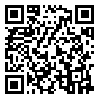BibTeX | RIS | EndNote | Medlars | ProCite | Reference Manager | RefWorks
Send citation to:
URL: http://jhr.ssu.ac.ir/article-1-311-en.html
2- Workplace & Occupational Health and Safety Research Center, Shahid Sadoughi University of Medical SciencesYazd, Iran. ,
3- Department of Health Education & Health Promotion, Shahid Sadoughi University of Medical SciencesYazd, Iran.
4- Shahid Sadoughi hospital, Shahid Sadoughi University of Medical Sciences,Yazd, Iran
Abstract
Introduction: Breast cancer is the most common cancer and one of the major causes of cancer deaths in women. Early diagnosis leads to significant reduction of mortality from breast cancer, in other words it can increase the lifespan of people with this cancer. This study aimed to determine the effect of education on knowledge and performance of 20-60 year old women in Yazd city about Breast Self Examination (BSE).
Materials & Methods: In this study, 100 women aged from 20 to 60 years old who referred to Yazd health centers were selected. They were matched in terms of cultural, social, and economical aspects. In this quasi-experimental study, data was collected through administration of questionnaires before and after training in two stages. The collected information were then analyzed using the statistical software SPSS (version 18) by T-tests and ANOVA. The significance level was set at 0.05.
Results: The results of statistical analyses revealed a significant difference between participants' knowledge and performance scores before and after training (0.05> p). In this study, age, marital status, education level, history of breastfeeding, and its duration had a significant relationship with participants' knowledge; also, positive family history of breast cancer had a significant relationship with their performance (0.05> p). Between the subjects' performance was a significant difference in two groups with negative and positive family history of Brest cancer before and after two months of educational program. (0.05> p).
Conclusion: According to the achieved results and the positive impact of education on the increase of knowledge and performance, educational programs in the field of breast cancer and its screening methods are recommended to be held for all age groups. In order to promote women's health from puberty to menopause more attention should be paid to the follow-up and training.
Received: 2016/06/12 | Accepted: 2016/09/13 | Published: 2016/09/13
| Rights and permissions | |
 |
This work is licensed under a Creative Commons Attribution 4.0 International License. |





